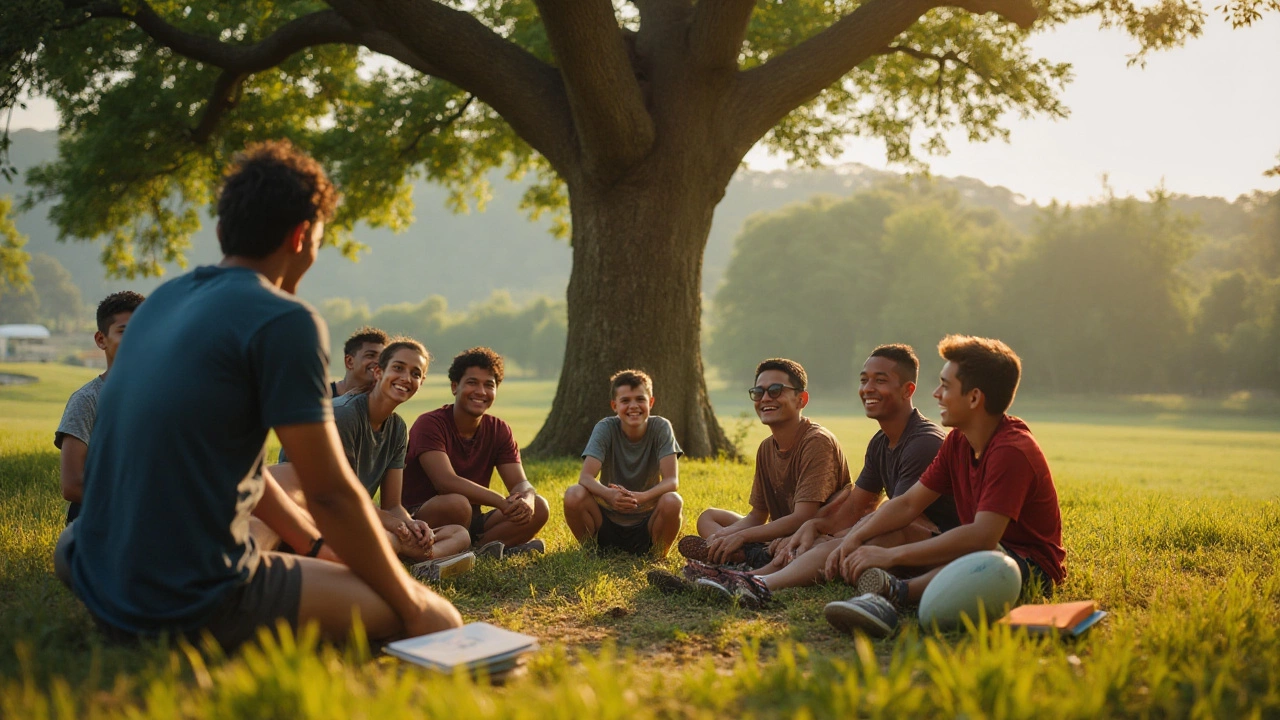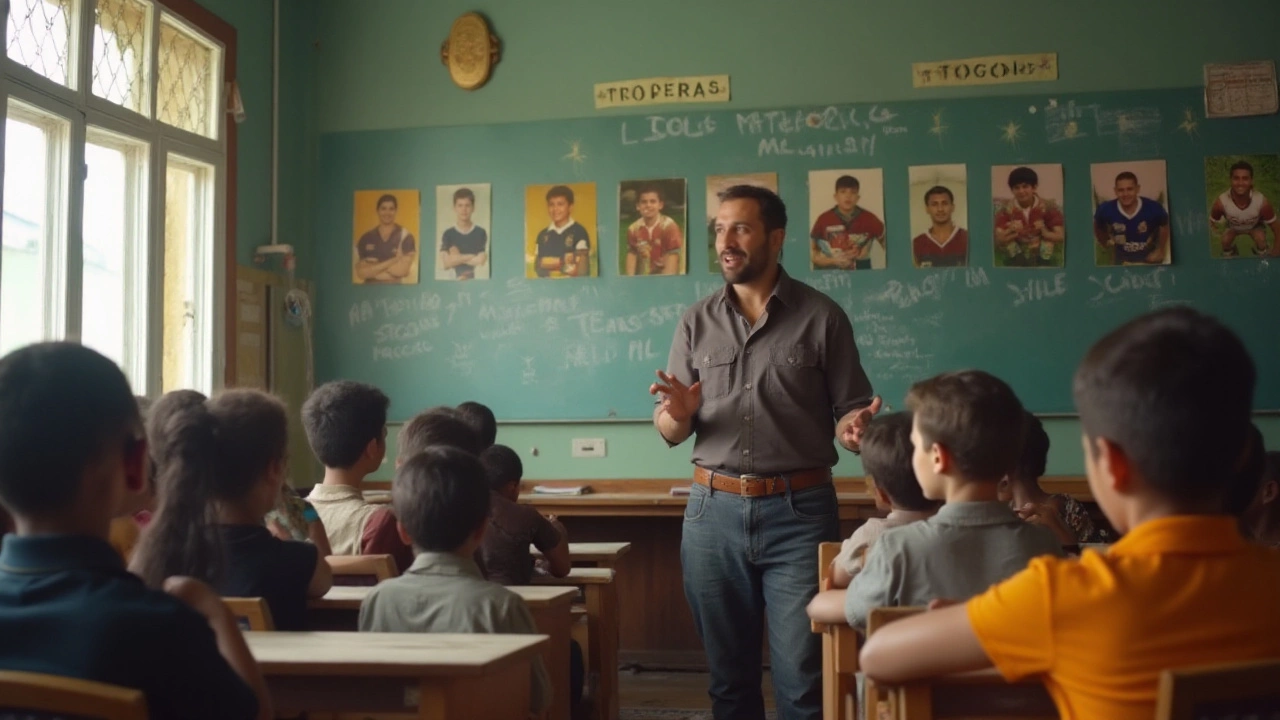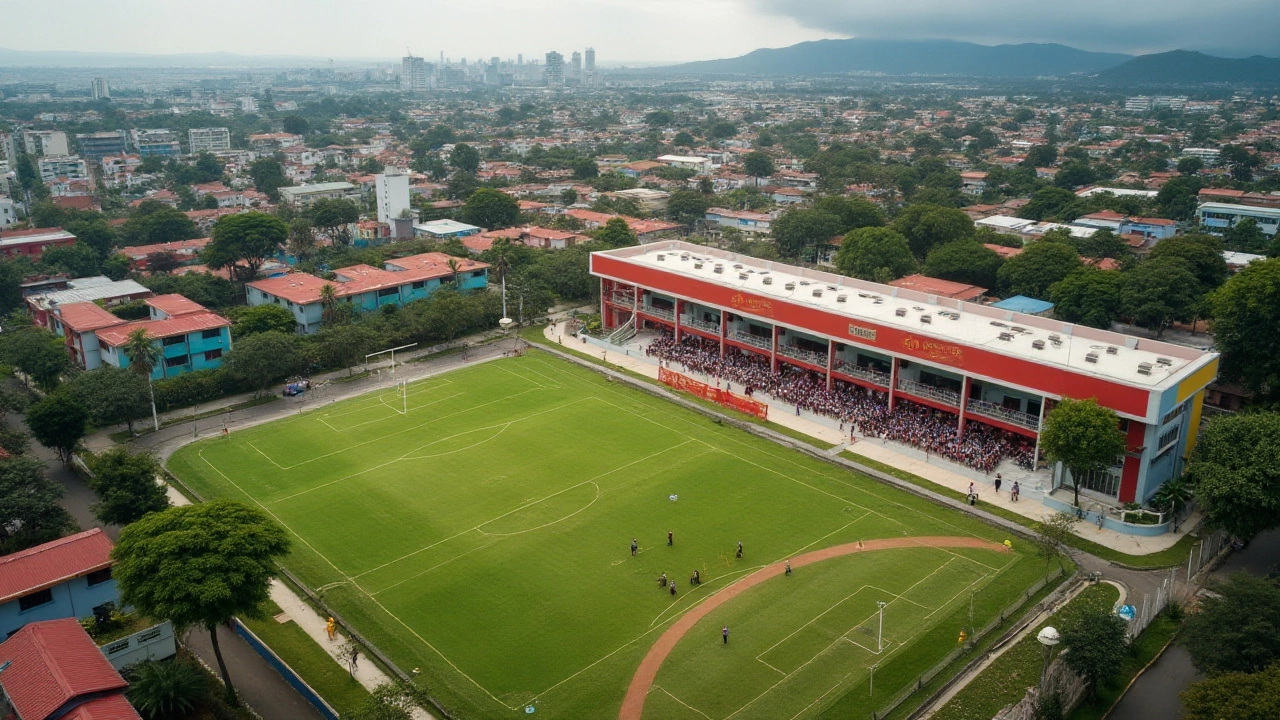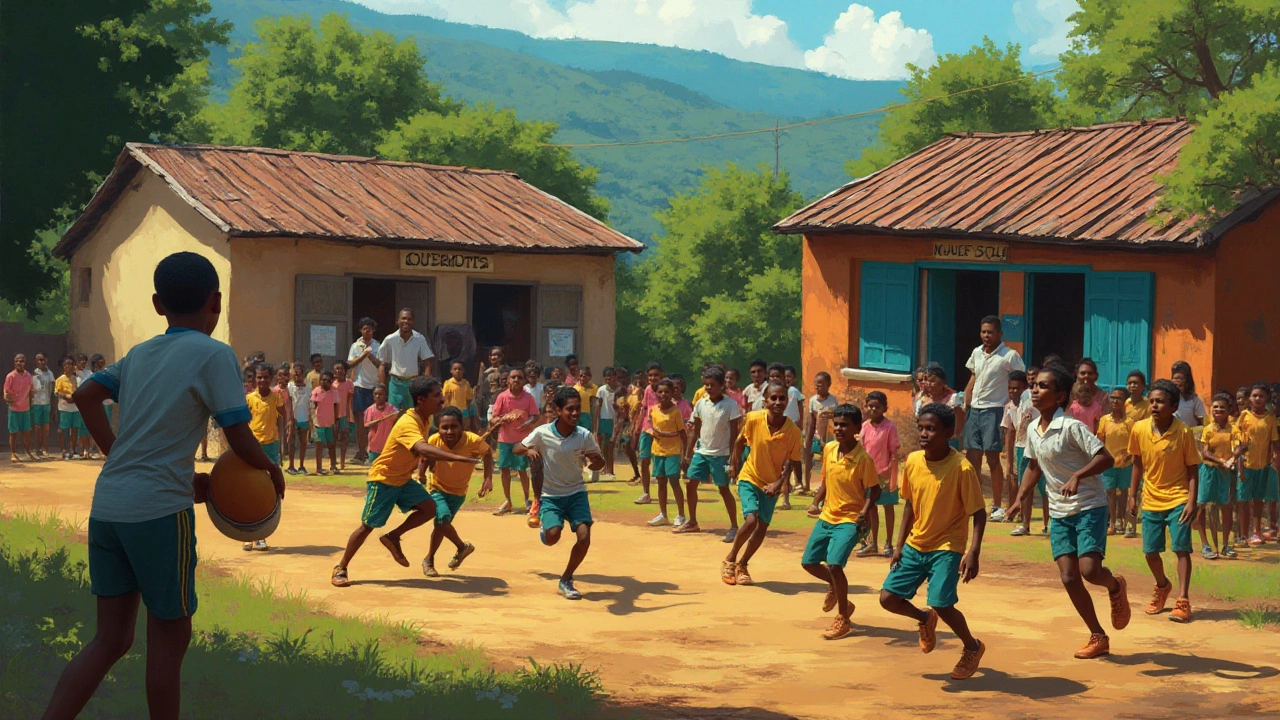Education in Brazil has been on quite the roller-coaster ride. From its historical roots to the dawn of new educational reforms, the landscape is ever-evolving. There's a palpable sense of expectation as educators, government officials, and communities strive to offer quality learning opportunities to all.
But what does rugby, a sport usually associated with another hemisphere, have to do with this educational odyssey? As it turns out, the role of rugby in promoting critical life skills and fostering educational engagement among young Brazilians is no longer a subplot but a narrative of its own.
Rugby fixtures, increasingly accessible to urban and rural communities alike, serve as more than just sporting events. They build bridges between diverse groups, bringing a sense of purpose and community. As this sport grows in popularity, its impact reaches beyond the field, inspiring a new wave of learning and cooperation.
In this article, let's dig deeper into how these two seemingly disparate domains intertwine to envision a brighter educational future for Brazil.
- The Educational Landscape in Brazil
- Rugby: A Growing Influence
- Linking Sports and Learning
- Future Prospects for Education and Rugby
The Educational Landscape in Brazil
Brazil, a sprawling country known for its vibrant culture and diverse population, also possesses a complex educational system that reflects its multifaceted nature. At the heart of this system lies a commitment to providing education across all societal layers, yet systemic challenges abound. Given the disparities between urban and rural regions, educational access and quality often vary dramatically, impacting student outcomes significantly. The country's efforts to accommodate over 50 million students are monumental, with public education being a primary focus amidst limited resources and fluctuating policy directions.
The Brazilian government has implemented several reforms over the years to ensure education is accessible to every young citizen. The introduction of programs such as Bolsa Família aims to reduce dropout rates by providing financial assistance conditioned on school attendance. The National Education Plan (Plano Nacional de Educação) sets targets like improving teacher quality and expanding higher education access. Despite these initiatives, obstacles like overcrowded classrooms, underqualified teachers, and insufficient infrastructure continue to hinder progress.
Education in regions like the Northeast faces specific challenges compared to the economic powerhouse in the Southeast. In rural areas, schools struggle with basic resources, and students often juggle work commitments with their studies. These realities starkly contrast with urban centers, where private schools offer advanced learning environments. Interestingly, Brazil's Institute of Geography and Statistics notes an increased literacy rate over recent decades, signaling potential growth amidst these challenges. A former education minister once remarked,
"The quest for education in Brazil is not just about instilling knowledge but also about bridging regional divides and fostering national unity."
Delving deeper, a significant component of Brazil’s educational landscape involves embracing new technologies. Schools across the nation strive to integrate digital tools into the curriculum, aiming to prepare students for a competitive global market. Initiatives focusing on coding and robotics symbolize this forward-thinking approach. Yet, digital divides remain, with rural regions often left behind in terms of connectivity and resources. The challenge remains how to disseminate these technologies equitably across the student population.
Participation in international assessments such as PISA sheds light on Brazil's comparative educational performance. Though strides have been made, Brazil often ranks lower than OECD averages, prompting dialogues on curriculum enhancements and pedagogical strategies. The presence of non-traditional subjects like physical education, including rugby, offers avenues for holistic growth, emphasizing teamwork, critical thinking, and problem-solving skills.
In this landscape, rugby has begun to influence educational methodologies, emphasizing the development of individuals both academically and socially. By fostering environments of inclusivity and cooperation, sports such as rugby present unique opportunities to engage students who might otherwise be marginalized. As Brazil navigates its path forward, the interplay between rugby fixtures and educational progress presents an intriguing dynamic, suggesting alternative pathways to enhancing student engagement and community cohesion.

Rugby: A Growing Influence
Rugby, often overshadowed by Brazil's football fame, is making its mark in the hearts of Brazilians and transforming communities in unexpected ways. This shift is more than just an adoption of a new sport—it's a cultural movement gaining traction across schools and social platforms. The rugby scene in Brazil began to take shape during the early 21st century, spurred by passionate enthusiasts who believed in the sport's potential to teach discipline, teamwork, and leadership. While rugby might not yet rival the popularity of samba football, its growth is evident in the increasing number of local clubs and school teams.
The sport's official recognition came under the umbrella of the Brazilian Rugby Confederation (CBRu), which has been instrumental in spreading the game's ethos. By focusing on youth development programs, the CBRu has initiated projects in cities like São Paulo and Rio de Janeiro, where rugby is steadily becoming an integral part of physical education curricula. Through these initiatives, students are not only engaged in physical activity but are also educated in essential life skills, which aligns with Brazil's broader educational goals. Rugby's influence can be seen as an avenue for social inclusion, where students from different socio-economic backgrounds come together, learning the importance of mutual respect and working towards common goals.
The rise of rugby has caught the attention of educators and policymakers who see it as a tool to bridge gaps in educational opportunities. The game offers a unique platform for character-building lessons that go beyond academic achievements. With its focus on strategy and collaboration, rugby is cultivating a new generation of thinkers in classrooms and on the field. According to a study conducted by the Brazil Institute of Sport and Education, schools incorporating rugby has shown a 20% increase in student participation in extracurricular activities, highlighting the sport’s appeal and potential to engage students who might otherwise be ambivalent about traditional sports.
One may wonder how this growth impacts local communities. The answer lies in the ripple effect that sports often have. Rugby has become a vehicle for community empowerment, especially in Brazil's underrepresented areas. As local clubs thrive, they create opportunities for young people to aspire to roles beyond mere participation. Aspiring players find role models in local teachers, coaches, and even international rugby figures who share success stories and reinforce positive values. A quote from former rugby player and coach, Lucas Duque, highlights this impact:
"Rugby is much more than a sport; it's a lifestyle that teaches resilience and camaraderie, qualities that our society can always benefit from."
The data on rugby's influence can be surprising at first glance. Consider the increase in rugby-related activities, illustrated in a simple statistics table:
| Year | Active Clubs | Registered Players |
|---|---|---|
| 2020 | 150 | 3,500 |
| 2023 | 230 | 6,800 |
These figures showcase a promising trend, suggesting that rugby is poised to leave a lasting legacy in Brazil’s education system. By strengthening ties between sport and learning frameworks, rugby not only 'grows' but sows seeds of brighter futures for students in all walks of life. With its deepening roots in Brazilian culture, rugby is undeniably a growing influence, a testament to the power of sport to inspire, educate, and unify communities.

Linking Sports and Learning
In the vibrant setting of Brazil, where samba rhythms and football feats dominate cultural expressions, the emergence of rugby offers a novel chapter in the educational narrative. This isn't merely about scoring tries or tackling opponents; it's about understanding how sports can become a vital tool in creating well-rounded individuals. The Brazilian education system, ambitious in its goals to cultivate informed citizens, has increasingly recognized the role of sports, like rugby, in molding character and fostering discipline among students.
Rugby, with its complex blend of strategic thinking and physical agility, is particularly suited for educational programs aiming to instill these qualities. Both teamwork and respect are core values inherent in the sport, providing a practical framework for teaching students the importance of cooperating towards shared goals. As these young minds engage in rugby, they inadvertently absorb lessons on leadership and perseverance, crucial competencies for life beyond sports.
Across various Brazilian schools, educators have begun integrating rugby as part of their extracurricular activities. Not only does this initiative offer a respite from traditional classroom settings, but it also encourages active participation from students who might not excel academically. The introduction of rugby has proven to be an equalizer, allowing students from different backgrounds to connect over shared experiences on the field. Besides, empirical evidence suggests that regular engagement in physical activities like rugby significantly enhances cognitive functions, improving concentration and memory.
"Rugby is not just a game; it's an education in disguise." - Carlos Nunes, Brazilian educational reformer.
Interestingly, studies conducted by Brazilian universities showcase how students involved in rugby programs tend to display heightened levels of social responsibility and empathy. These attributes are invaluable as they contribute to creating a sense of community, essential for addressing social disparities prevalent in some parts of the country. Moreover, the principles taught through rugby resonate in academic efforts, revealing stronger classroom engagement and reduced dropout rates among participating students.
A recent survey conducted in Rio de Janeiro revealed that over 60% of schools that incorporated rugby noticed a surge in both student attendance and participation in other school activities. This trend is a testament to how engaging in sports like rugby can ignite a sense of belonging and motivation within the school environment. Schools are now increasingly considering creating more structured rugby inclusive curricula, understanding its significant contribution to both physical health and mental well-being.
In a nation as diverse as Brazil, fostering a robust connection between sports and education bridges the gap between varied socio-economic groups, offering a shared platform for growth and success. As rugby fixtures gain traction, they transcend beyond mere entertainment, becoming a catalyst in transforming how learning is perceived and delivered. The spirited enthusiasm of rugby coaches and players, both local and international, persists in this mission, blending the power of sport with the pursuit of knowledge.

Future Prospects for Education and Rugby
When analyzing the future of education in Brazil, one can't ignore the burgeoning role that sports, notably rugby, may continue to play. In recent years, there's been a discernible shift in how people perceive learning outside of a traditional classroom setting. This is particularly true in communities where educational resources are sparse, yet aspirations remain high. By integrating sports like rugby into the education system, there's hope for a dynamic learning model where students acquire both academic and life skills.
The idea is not without its challenges, of course. Brazil's geographical and socio-economic diversity presents a range of hurdles when trying to implement nationwide educational initiatives. However, facilitating access to sports programs often provides a unique avenue for inclusivity. By using rugby as a medium, educators can foster teamwork, discipline, and perseverance—skills that are just as vital as reading or mathematics. Moreover, integrating rugby into physical education curriculums could see a rise in the sport's reputation, making it an attractive extracurricular activity.
This potential is highlighted by comments made by Thomaz Gambogi, the president of Rugby Brasil. As mentioned in an interview, "By harnessing the power of rugby, we aim not just to create athletes, but also well-rounded individuals capable of collaboration and critical thinking." His vision echoes the growing consensus that sports and education do not need to operate separately but can, in fact, complement one another to create a more effective learning environment.
As interest in rugby increases, so too does the opportunity for regional competitions and partnerships with international bodies dedicated to sports development. Organizations such as World Rugby can offer support and resources to help nurture young talent and provide pathways to greater success on and off the field. Additionally, the increased visibility of the sport, with its thematic emphasis on diversity and inclusion, aligns well with Brazil’s educational goals.
| Year | Number of Schools with Rugby Programs | Rugby Participation Increase (%) |
|---|---|---|
| 2020 | 150 | 10% |
| 2023 | 300 | 25% |
| 2025 Projected | 450 | 40% |
In looking forward, one may predict that the intersection of education and rugby in Brazil will continue to evolve. As the sport becomes more ingrained in educational strategies, students from diverse backgrounds can expect more opportunities to thrive holistically. By prioritizing both mental and physical development, Brazil's future generations stand to gain skills that transcend the confines of the classroom, preparing them for the varied challenges of the world beyond.
